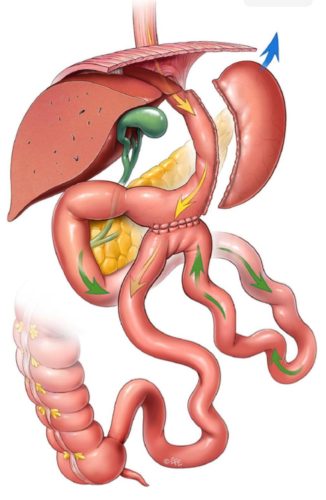BTI is a bariatric-metabolic surgery technique that involves creating two pathways for food to bypass a portion of the small intestine. Intestinal transit bipartition is a surgical technique that has revolutionized the approach to obesity and type 2 diabetes. It consists of reconfiguring the small intestine by dividing it into two segments. This anatomical modification induces physiological changes that promote weight loss and glycemic control.
Physiological Basis:
- Increased secretion of incretins: Incretins are intestinal hormones that stimulate insulin release and reduce glucagon production, improving glycemic control (current medications for diabetes and weight loss originated from this type of ileal surgeries due to their anatomical confirmation towards the terminal ileum).
- Increased exposure of the intestinal epithelium to bile acids: This modification alters fat absorption and promotes a feeling of satiety.
- Modification of the intestinal microbiota: The new intestinal configuration influences the composition of gut bacteria, which can contribute to weight loss and improved metabolism.
Advantages over other procedures:
- Greater simplicity: It is a less complex technique than other bariatric surgeries, resulting in shorter surgical time and lower risk of complications.
- Better metabolic results: Studies have shown that intestinal transit bipartition is highly effective in the remission of type 2 diabetes and sustained weight loss.
- Lower risk of malabsorption: Unlike other techniques that can cause severe nutritional deficiencies, intestinal transit bipartition usually preserves the absorption of essential nutrients.



